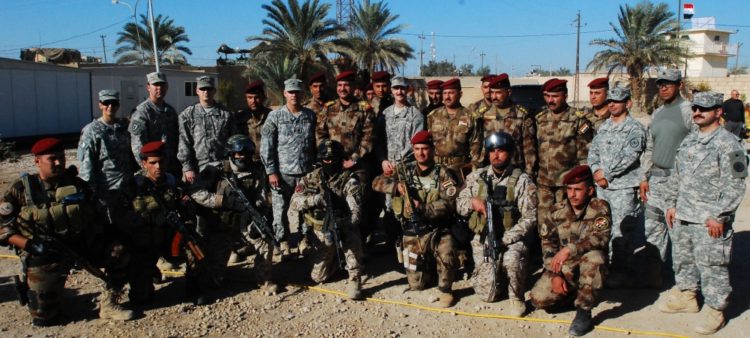Iraq has requested a date to resume strategic talks on the withdrawal of the remaining U.S. troops, both Iraqi and American officials confirmed on Tuesday.
“We look forward to renewing our Strategic Dialogue with the Government of Iraq over the month of April,” White House Press Secretary Jen Psaki said in a briefing to the media.
Psaki added that several topics, including mutual security and trade, would be discussed and the talks would “further clarify that coalition forces are in Iraq solely for the purpose of training and advising Iraqi forces to ensure that ISIS cannot reconstitute.”
Last June, the Trump administration began discussions with the Iraqi government which would, it was hoped, shape the future of the U.S.-Iraq relation. President Trump had made it clear that it was his administration’s goal to end, what he characterized as America’s “forever wars.” He lowered the troop levels in Iraq from about 5,200 to 2,500, which is the current number.
The U.S. had a bellicose relationship with Iraq, during the reign of Saddam Hussein, which led to the first Gulf War of 1990-91 and the invasion of Iraq in 2003. U.S. troops remained in Iraq until 2011, but an arguably too hasty withdrawal then gave rise to the Islamic State (ISIS), which captured vast swaths of Iraq and Syria. U.S. troops returned to fight in Syria.
U.S. troops have been attacked dozens of times by Iranian proxy militias that are supposed to be fighting ISIS as well. The proxy militias have attacked both bases that house American and coalition troops as well as the U.S. Embassy in Iraq. Relations between Iraq and the U.S. took a turn for the worse after the U.S. began responding to these attacks. Continued escalation led to an American airstrike in January 2020 which killed Iranian Major General Qassem Soleimani and Iraqi militia leader Abu Mahdi al-Muhandis just outside Baghdad’s airport.
In response, Iraqi Shiite lawmakers called for the government to oust “the illegal occupation” of American forces, parroting a line from Tehran, forgetting that the U.S.-led coalition was there at the request of the Iraqi government. Furthermore, the Shiite factions conveniently ignored that the militia attacks on U.S. interests also killed Iraqi civilians and security forces.
The relationship between Washington and Baghdad has improved since Prime Minister Mustafa al-Kadhimi assumed office in May. Nonetheless, al-Kadmini has come under pressure from the Iran-backed Fatah bloc, which continues to call for the withdrawal of U.S. forces. Last summer, the militias even threatened to remove al-Kadhimi from office.
The scheduled discussions in April will be the first time that President Biden will be involved in the future of the U.S.-Iraq relationship.
Iraqi and U.S. officials have both stated that they support a withdrawal of U.S. forces from Iraq. However, the question over the withdrawal’s timeframe remains as the threat of ISIS looms.
Already have an account? Sign In
Two ways to continue to read this article.
Subscribe
$1.99
every 4 weeks
- Unlimited access to all articles
- Support independent journalism
- Ad-free reading experience
Subscribe Now
Recurring Monthly. Cancel Anytime.











COMMENTS